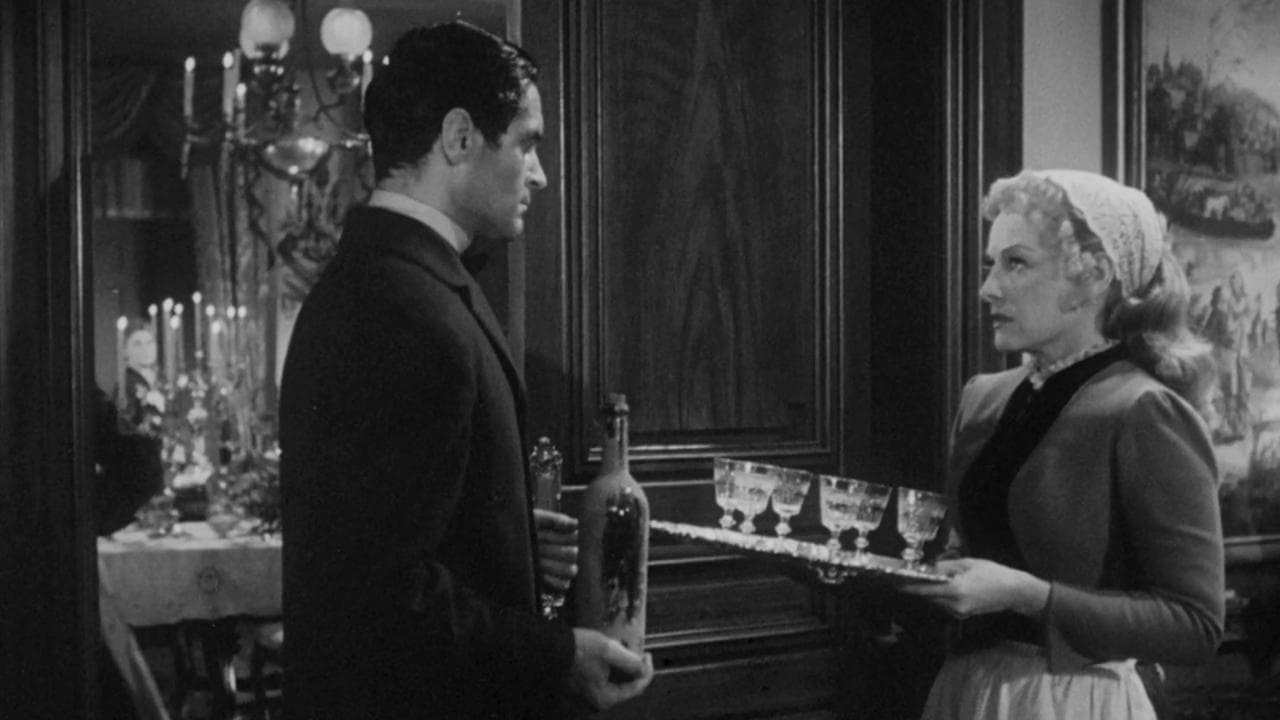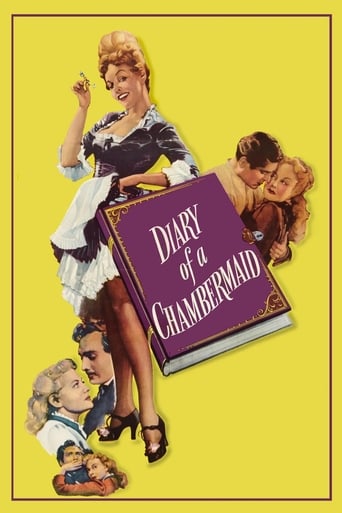

A double-bill of two films transmuting Octave Mirbeau's source novel LE JOURNAL D'UNE FEMME DE CHAMBRE onto the celluloid, made by two cinematic titans: Jean Renoir and Luis Buñuel, 18 years apart. Renoir's version is made in 1946 during his Hollywood spell, starring Paulette Goddard as our heroine Celestine, a Parisian girl arrives in the rural Lanlaire mansion to work as the chambermaid in 1885, barely alighting from the train, Celestine has already been rebuffed by the haughty valet Joseph (an excellently surly Lederer), and confides to the also newly arrived scullery maid Louise (a mousy and dowdy Irene Ryan) that she will do whatever in her power to advancing her social position and firmly proclaims that love is absolutely off limits, and the film uses the literal diary- writing sequences as a recurrent motif to trace Celestine's inner thoughts. The objects of her tease are Captain Lanlaire (Owen), the patriarch who has relinquished his monetary sovereignty to his wife (Judith Anderson, emanating a tangy air of gentility and callousness); and Captain Mauger (a comical Burgess Meredith, who also pens the screenplay off his own bat), the Lanlaire's goofy neighbor who has a florae-wolfing proclivity and is perennially at loggerheads with the former on grounds of the discrepancy in their political slants, both are caricatured as lecherous old geezers with the death of a pet squirrel prefiguring the less jaunty denouement. In Renoir's book, the story has a central belle-époque sickly romantic sophistication to sabotage Celestine's materialistic pursuit, here her love interest is George (Hurd Hatfield), the infirm son of the Lanlaire family, a defeatist borne out of upper-crust comfort and has no self-assurance to hazard a courtship to the one he hankers after. Only when Joseph, a proletariat like Celestine, turns murderous and betrays his rapacious nature, and foists a hapless Celestine into going away with him, is George spurred into action, but he is physically no match of Joseph, only with the succor from the plebeian mob on the Bastille Day, Celestine is whisked out of harm's way, the entire process is shrouded by a jocose and melodramatic state of exigency and Renoir makes ascertain that its impact is wholesome and wonderfully eye-pleasing. In paralleled with Buñuel's interpretation of the story, Renoir has his innate affinity towards the aristocracy (however ludicrous and enfeebled are those peopled) and its paraphernalia, the story is less lurid and occasionally gets off on a comedic bent through Goddard's vibrant performance juggling between a social-climber and a damsel-in-distress. The same adjective "comedic", "vibrant" certainly doesn't pertain to Buñuel's version, here the time-line has been relocated to the mid-1930s, Celestine (played by Jeanne Moreau with toothsome reticence and ambivalence) more often than not, keeps her own counsel, we don't even once see her writing on the titular diary, she works for Mr. and Mrs Monteil (Piccoli and Lugagne), who are childless but live with Madame's father Mr. Rabour (Ozenne, decorous in his condescending aloofness), an aristo secretly revels in boots fetish in spite of his dotage. Here the bourgeois combo is composed of a frigid and niggardly wife, a sexed-up and henpecked husband (Mr. Piccoli makes for a particularly farcical womanizer, armed with the same pick-up line), a seemingly genteel but kinky father, and Captain Mauger (Ivernel), here is less cartoonish but no less uppity, objectionable and erratic; whereas Joseph (Géret), is a rightist, anti-Semitic groom whose perversion is to a great extent much more obscene (rape, mutilation and pedophilia are not for those fainted hearts). Amongst those anathemas, Celestine must put on her poker face, or sometimes even a bored face to be pliant (she even acquiesces to be called as Marie which Goddard thinks better of in Renoir's movie), she is apparently stand-offish but covertly rebellious, and when a heinous crime occurs (a Red Riding Hood tale garnished with snails), she instinctively decides to seek justice and tries insinuating her way into a confession from the suspect through her corporeal submission, only the perpetrator is not a dolt either, unlike Renoir's Joseph, he knows what is at stakes and knows when to jettison his prey and start anew, that is a quite disturbing finale if one is not familiar with an ending where a murderer gets away with his grisly crime. But Buñuel cunningly precedes the ending with a close-up of a contemplating Celestine, after she finally earns her breakfast-in-bed privilege, it could suggest that what followed is derived from her fantasy, which can dodge the bullet if there must be. Brandishing his implacable anti-bourgeoisie flag, Buñuel thoughtfully blunts his surrealistic abandon to give more room for dramaturgy and logical equilibrium, which commendably conjures up an astringent satire laying into the depravity and inhumanity of the privileged but also doesn't mince words in asserting that it doesn't live and die with them, original sin is immanent, one just cannot be too watchful. Last but definitely not the least, R.I.P. the one and only Ms. Moreau, who just passed away at the age of 89, and in this film she is a formidable heroine, brave, sultry and immune to all the mushy sentiments, whose fierce, inscrutable look is more than a reflection of her temperaments, but a riveting affidavit of a bygone era's defining feature.
... View MoreIt has a touch that seems like the actors are fooling around. Total, not seriously, that's all. Especially towards the end. At first it is fine but it is losing bellows and as is customary in Renoir, it mixes the genres in such a way that it does not make any sense.Spoiler:I do not know if it has ulterior motives although it seems to me that yes and I do not like anything, I speak of incest. It is clear that horns are spoken.The neighbor, is not that character unbearable? Always jumping.Why does Paulette want to go with Francis? That man is scary. He has not felt anything for him in the whole movie. For money? But he has the son and on top he gets along with him.The ending, it seemed a bad movie of laughter, could not believe that it had degenerated so much the film. I will not go into technical sections. Or I like none.In the end I did not know if they were laughing at me or what
... View MoreOctave Mirbeau's brilliant, chilling novel was written more than 100 years ago, but its sordid, sexy, near-surrealistic mood and story could not possibly be given a worthy treatment in 1946, and certainly not in an America still subject to the Hays code. This film takes only some of the incidents in the episodic novel and tries to make the story into an eccentric romantic comedy. But, minus the mood and ambiance of the novel, the result is awkward and odd. An important aspect of the novel, anti-semitism (the book was written when France was torn apart by the Dreyfus case) is completely left out, and, instead of perversion and cruelty, Celestine experiences, from her employers, only annoyance. The performances are lightweight, except for Francis Lederer (always good at gentlemanly brutes) as the sinister valet. The film's only moments of horror occur when he indulges his talent, and taste, for discreet violence.Nothing the great Renoir directed is without interest, and this Diary certainly has moments of beauty and affectionate comedy. But a much more accurate adaptation was Bunuel's in 1964. He left in the anti- semitism, and his own sexy-sadistic-surrealistic mood was a perfect match for Mirbeau's. One moment in this story reminded me of a similar incident, one of my favourites in a Bunuel film. The family for whom the chambermaid works lives next to a peppery, eccentric old man who demonstrates his loathing for his neighbours by throwing rocks through the panes of their greenhouse. In The Exterminating Angel, the partygoers are frightened when a brick is thrown through the window. The host calms them with "It's nothing. Just a passing Jew." Priceless!
... View MoreThe Diary of a Chambermaid is a transitional film in the development of Renoir's lesser known stylistic system. Braudy would later distinguish Renoir's two systems as being tied to theater and realism respectively (although there have been compelling arguments about these categories being either reductive or simply misnomers). Goddard is the focus of the story (much in the same way Renoir later uses Magnani, Arnoul and Bergman). The camera tracks her action, her closeups are one-shot, there are alternating shot scales in single scenes to emphasize her character's psychological reaction to events, studio exteriors help idealize the framing of her screen personality and high/low angle shots purvey her psychological perspective on group dynamics. Celestine (Goddard) has an ambiguity to her motivation that heightens psychological identification. It is unclear as to whether she sees the world divided into classes or sexes, or both. The ending is a happy one, and the politics is further subverted through jovial and emotionally-charged highly-individualized characters. Non-diegetic soundtrack is employed to increase distinctions in the emotional responses of different characters. Depth of field is at the service of Celestine's staging while obstructions in the mise-en-scene become incorporated into the plot. In this respect, the camera is not an unobtrusive one. There is an inconsistency in the use of stylistics, where on one hand reframing pans are fully at the service of psychological identification and privilege of the transcendental subject position while the long take mobile framing of the July 14th celebration reminisce on M.Lange, Illusion and Regle. Diary is a melodrama with comedic elements to take the edges off, but when the master of the house reads in the morning paper "another woman murdered in Paris, another woman cut to pieces" there is no doubt that Renoir is infusing a consideration for the plight of women in a misogynist society. This was very important to him and perhaps the dark undertones of this film have something to say about the repression he experienced working in Hollywood for the war. How Burgess Meredith factors into all that remains to be seen.
... View More